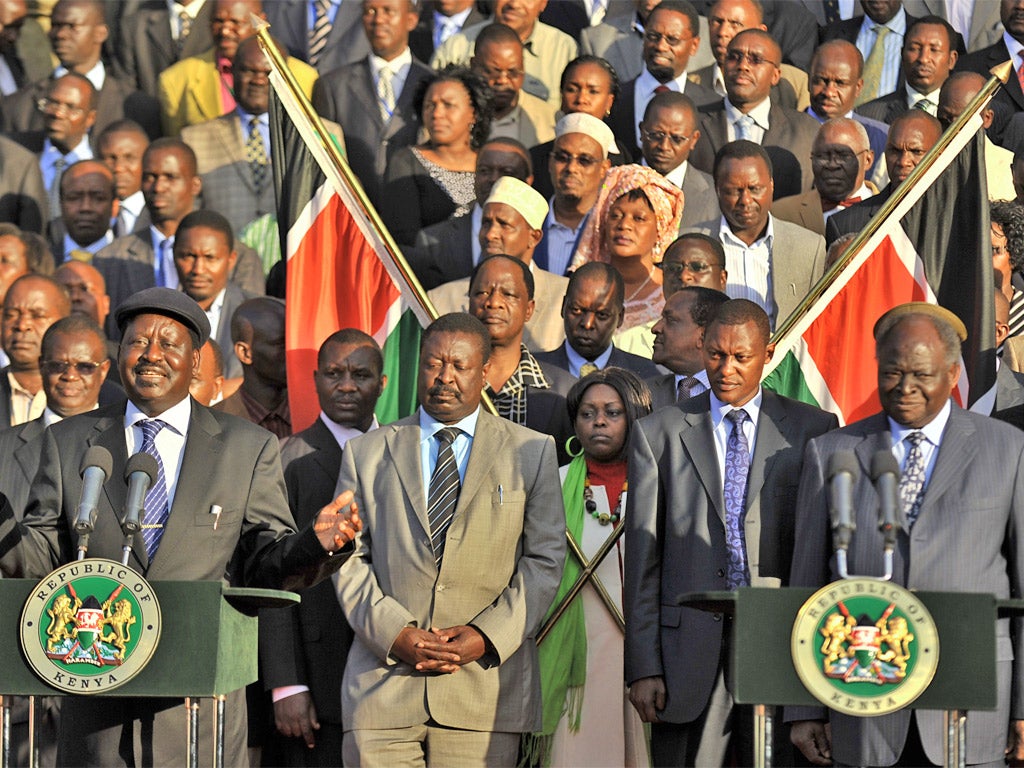Kenya’s president vetoes attempt by MPs to award themselves £16 million pay-off after furious public protests
There was widespread anger in the economically troubled East African nation after a secretive move to amend a finance bill to include a lucrative golden handshake of £69,000 each for MPs whose term ends in January.

Kenya’s president has vetoed an attempt by MPs in the country to award themselves a pay-off worth £16m after it prompted furious public protests.
There was widespread anger in the economically troubled East African nation after a secretive move last Thursday to amend a finance bill to include a lucrative golden handshake of £69,000 each for MPs whose term ends in January. The parliamentarians must now decide whether to challenge the president, Mwai Kibaki, and attempt to overturn the veto with a fresh vote that would require a two-thirds majority.
Kenyan MPs are already among the most richly remunerated in the world with a monthly pay packet of £6,546 in a country where the minimum wage for those in work is less than £80 a month. When news of their latest pay hike broke demonstrators thronged the capital, Nairobi, with placards reading: “You can't have my money for greedy MPs” and “Not my taxes, give them rats”.
Historically greedy legislators were stripped of the right to vote themselves pay rises under the terms of a new constitution, which was backed two years ago by a majority of Kenyans. During the last pay round in 2010, MPs tried to bump their monthly take-home by 25 per cent up to £8,384 but were blocked by the prime minister in response to public protests.
A new independent body, the Salaries and Remunerations Commission, was established to set rates of public sector pay but some MPs used a procedural trick to make a grab for more money.
Late on Thursday night an unannounced amendment to the finance bill was introduced and passed with only 30 of the country's 222 MPs present. The severance pay would have applied to all of the country's MPs as constituencies have been redrawn since the last election and parliament is being expanded to 349 members.
The sly effort to pad MPs' wages comes after a wave of public sector strikes have hit Kenya with teachers, doctors and other civil servants demanding pay rises in line with the rising cost of living. The government allowed schools to close and hospitals to be left unmanned for several weeks as it insisted that there was no money for salary increases.
Mwalimu Mati, the head of Mars Group, a Kenyan corruption watchdog, said: “We note that yet again [MPs] and the parliamentary service commission have abused their privileges and disregarded all rules of decency... to yet again enact increases to their personal remuneration and allowances.”
Kenya's MPs are generally seen to be underperforming despite the extraordinary benefits they demand. A recent Harvard study said that Kenya's economy should be growing by 7 per cent a year, whereas growth in the last quarter was 3.5 per cent. Fewer than 4 out of 10 Kenyans believe the popular new constitution will be fully implemented, according to a recent survey by the pollster Gallup.
Questions were also asked over a recent refurbishment of the parliament in Nairobi where a contract was awarded to a foreign firm to produce £3,125 seats for the new intake of MPs. That tender was cancelled and a new one given to the Kenyan prisons service who produced 350 red leather seats for £1,875 each.
Kenya's empty coffers and the recent public sector pay rounds have already resulted in a raft of new taxes that may damage the country's growth prospects. A new 10 per cent tariff will hit mobile money transfers -- one of Kenya's global success stories -- as well as ATM withdrawals and other financial transactions. The government in Nairobi is already spending 60 per cent of its budget on recurrent expenditure, the bulk of which is made up by public sector salaries.
Subscribe to Independent Premium to bookmark this article
Want to bookmark your favourite articles and stories to read or reference later? Start your Independent Premium subscription today.

Join our commenting forum
Join thought-provoking conversations, follow other Independent readers and see their replies